8.11.19 – 13.02.10
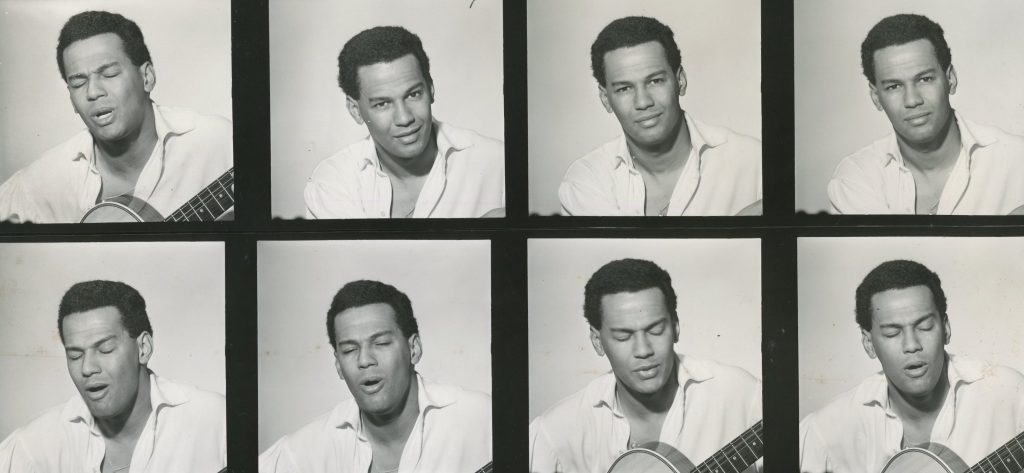
Tall, good-looking, talented and personable, when new RAF recruit Cyril Ewart Lionel Grant arrived in Britain from the West Indies in 1942, he was welcomed as a hero. Commissioned as a Flight Lieutenant, Grant trained as a navigator and flew in Lancaster bombers. However, a decade later, in spite of becoming a qualified barrister, Grant found himself in an England where attitudes to race had hardened. He spent his life contesting such negative attitudes, and achieved a significant success in promoting a multi-cultural Britain, through his writing, acting and organisational skills. Like the painter Frank Bowling, ‘Cy’ Grant (1919-2010) was born and raised in Guyana, (then known as British Guiana) and grew up near the Demerera river, and later in the town of New Amsterdam. Beterveragting, his home town, is notable for having been purchased in the 1830’s by a co-operative of former slaves, and Grant himself, one of a family of seven, was the great-grandson of a slave. However, he was born into a middle-class family and had a good education, albeit learning mostly about English history and little about the Caribbean. He inherited a love of music from his mother, a music teacher, while his father, a Moravian minister, introduced him to literature, emphasising to his son that some famous European authors such as Alexander Pushkin and Alexandre Dumas were black. Grant worked for a time for a magistrate in Guyana, gaining experience in legal affairs, but his family could not afford to send him abroad to study law.
During WWII, along with hundreds of other men and women in the West Indies, Grant was recruited by the British armed forces and took ship to England. Commissioned as a Flight Lieutenant in the RAF, he was navigator on a Lancaster bomber of 103 Squadron based at Elsham Wolds, near Grimsby in Lincolnshire. In 1943, after being shot down over the Netherlands, he spent two years in a prisoner of war camp, Stalag Luft III, where he made good use of his enforced captivity, studying and writing poetry. A photograph of him taken by the Germans during this period was titled ‘a member of the RAF of indeterminate race’—a phrase that would later become the title of his autobiography. Although he qualified as a barrister in 1950, specialising in anti-racism cases, Grant found that he was discriminated against because of his skin colour and West Indian origins. For a time he persevered with his studies, availing of a three year scholarship under the Colonial Scheme for Further Education and Vocational Training, and to improve his diction joined an amateur theatre group, where he discovered he had a talent for acting. In time, however, Grant abandoned his hopes of becoming a barrister, finding he could earn a much better living as a singer and actor. He featured on entertainment shows on radio and television, including Cliff Mitchelmore’s Tonight programme, where he sang, in an engaging calypso style, ditties penned by Bernard Levin, such as
Heartache today for the deb’s delight,
no more of those glamorous nights;
So shed a tear for the deb of the year,
who lost her vocation in mid-career.
He stayed with the Tonight programme for several years, but left when he felt that he was being patronised and typecast by Mitchelmore.
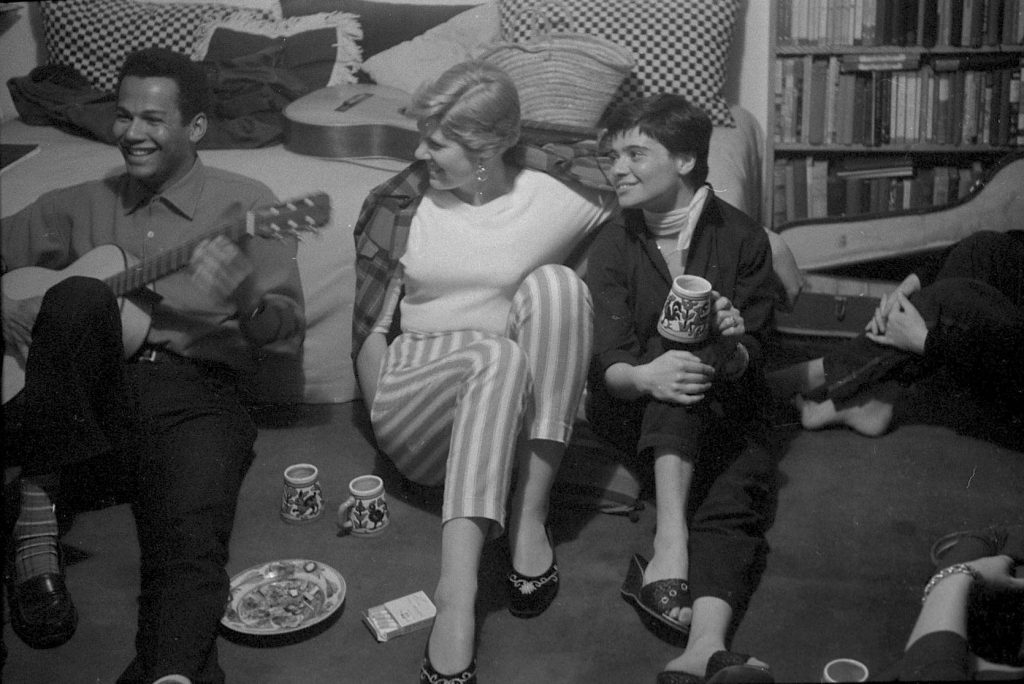
Photograph by Adrian Flowers
During these years Adrian Flowers photographed Cy Grant on several occasions. The earliest photographs were taken on
20th November 1954 (Job no. 1367), taken on black and white 120mm film. They are portrait shots, mainly head and shoulders, although in some of these images, Grant is playing the guitar. On 21st June 1955 (Job. no. 1625), Flowers photographed Grant at a social event, probably a small party held at Cy and his wife Dorit’s house in Highgate.

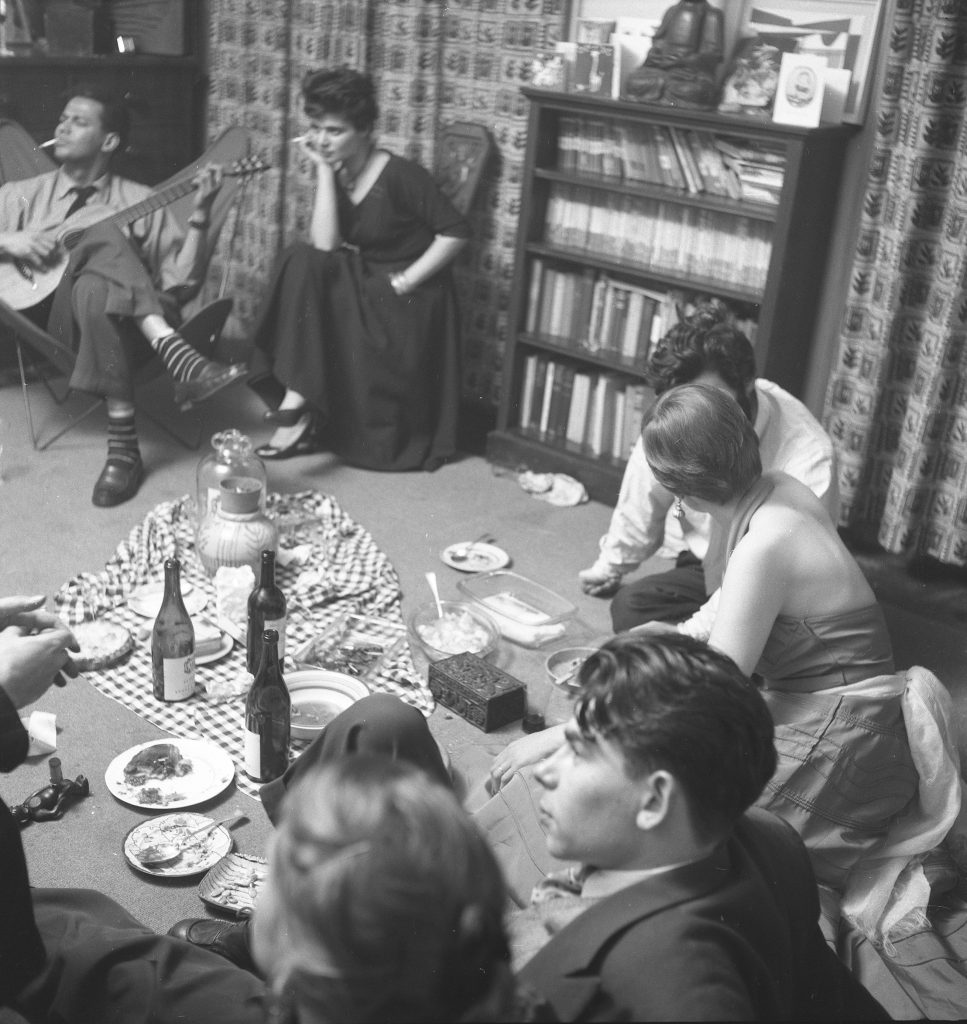
Photograph by Adrian Flowers
Later that year, on 19thDecember (Job No. 1397, 1955) at a supper party held to celebrate Angela Flowers’ 23rd birthday, a group of friends including Cy and Dorit, Heinz Kurth and the poet Jon Silkin gathered at the Flowers’s flat in England’s Lane. Aged nineteen, Dinah Holland, younger sister of Angela, also attended the party, which was informal, with guests sitting on the floor around a tablecloth spread out picnic-style.
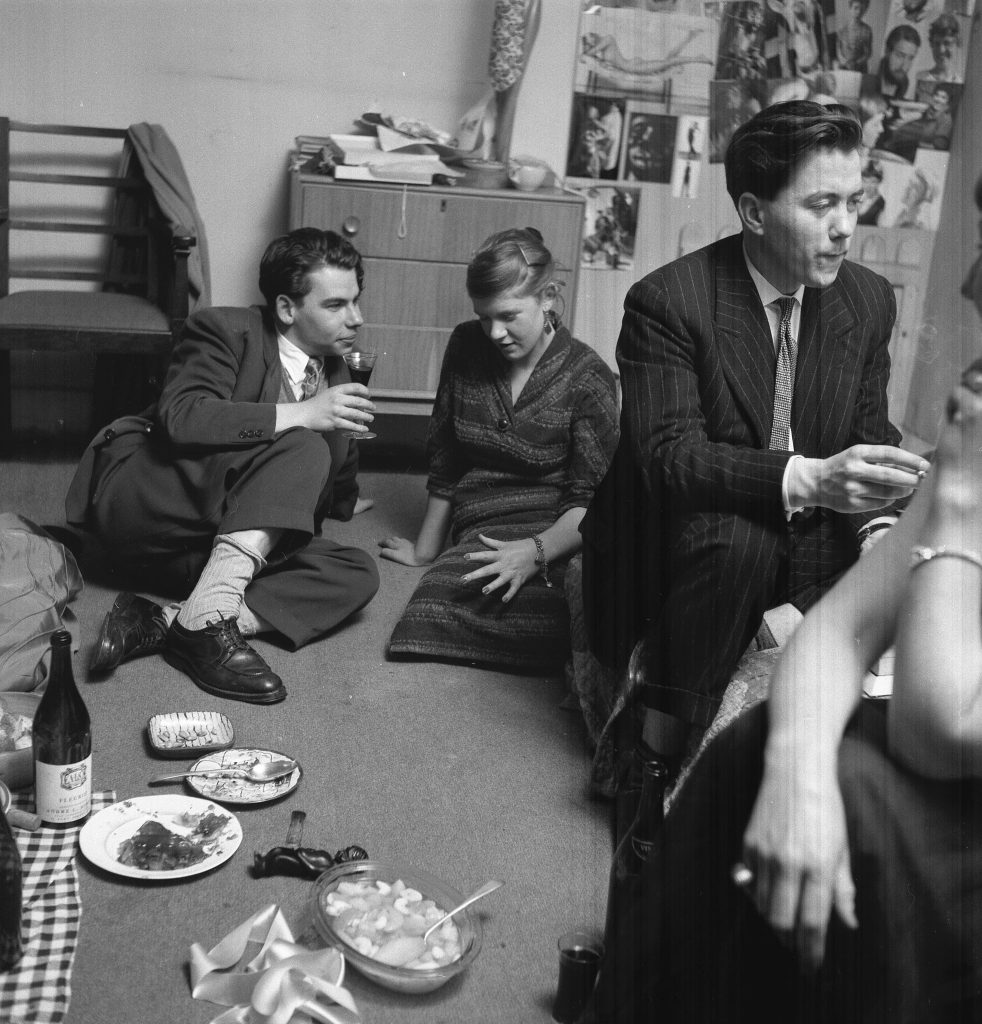
Photograph by Adrian Flowers
In one photo, Angela is filling a glass and handing it to Silkin, while in another Grant plays the guitar. Bottles of wine and a Greek vase on the tablecloth lent a Mediterranean flavour to the party. Dorit was expecting her first child at this time and in June 1956 (Job no. 2017), Flowers photographed her and her infant daughter Dana.
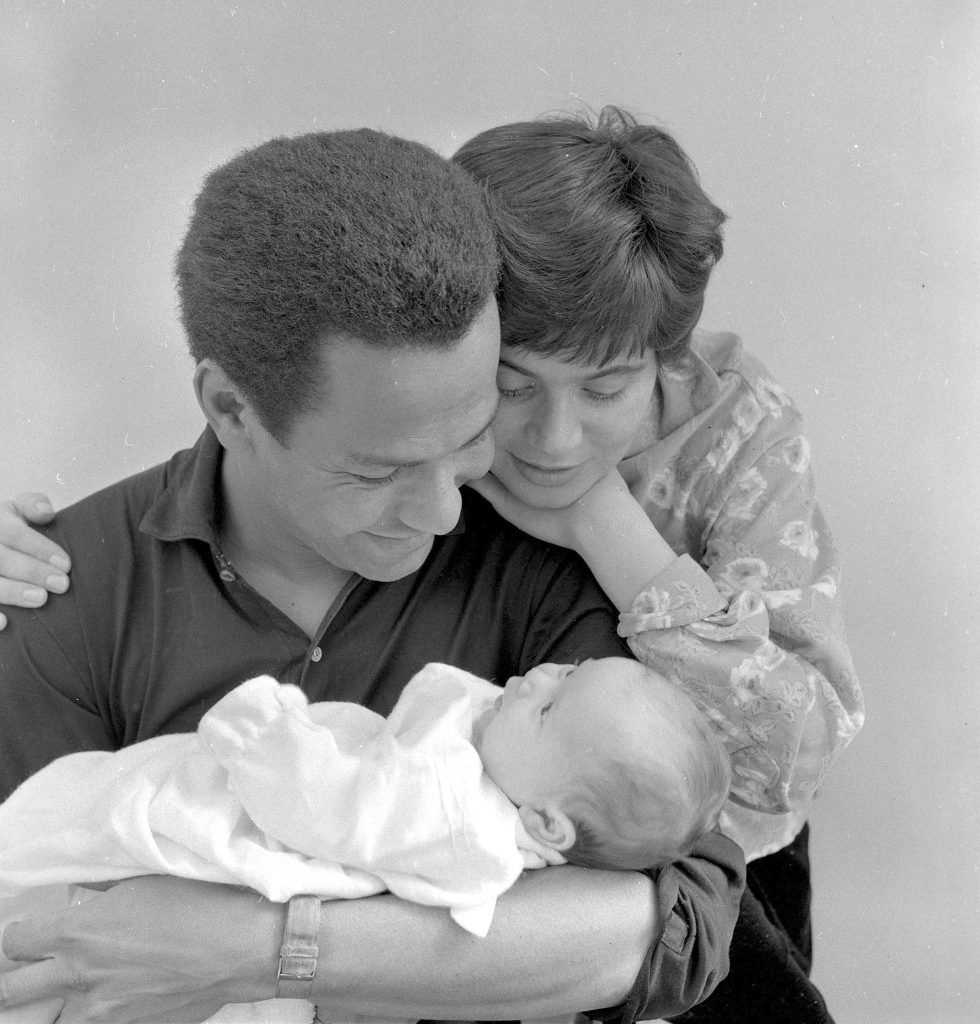
Photograph by Adrian Flowers
In October of that year (Job no 2188), in what appears to be an improvised recording studio in the England’s Lane flat, Flowers photographed Grant playing the guitar and singing into a microphone. Not long afterwards, when Adrian and Angela had moved to a new flat in Grange Road, Highgate, they held a small party, with Cy and Dorit present. Angela had given birth to her second son Matthew a few days earlier, so the event was probably to celebrate the new arrival. (Job No. 2258)
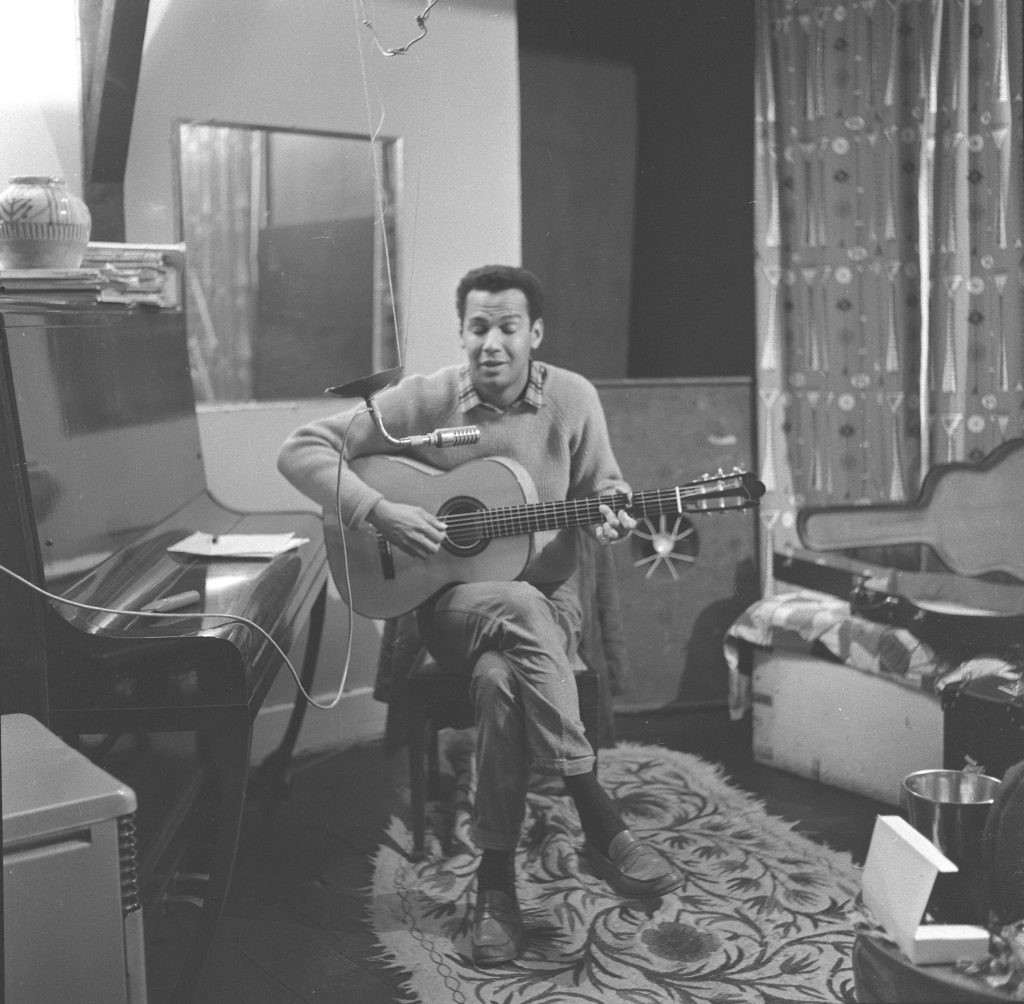
That same year, 1956, Cy Grant became the first black person to host his own British television programme, For Members Only, and the following year, in Sea Wife, a film set in the Pacific during WWII, he played the role of a ship’s purser who, along with three passengers, is stranded in a life raft after their ship is sunk by a Japanese submarine. Although a romance, featuring also Richard Burton and Joan Collins, Sea Wife is unsentimental in its depiction of colonial attitudes. Grant saves the lives of his companions, but is persecuted by the fourth occupant of the liferaft, a deranged white Englishman, and, in a shocking scene, is abandoned in a lagoon where he is killed by a shark. In playing the role of ship’s purser, Grant hoped to improve attitudes in Britain towards immigrants from the West Indies. In another film, The Man from the Sun, he again directly confronted racist attitudes. Although Grant chose his roles carefully, it was difficult for him to avoid being stereotyped. During the first performance of the musical The Roar of the Greasepaint, the Smell of the Crowd, staged in Nottingham in 1964, he sang “Feeling Good”, (subsequently released on the record Cy and I). The lyrics herald a ‘new dawn, a new day’, but Grant was cast in the role of ‘Negro’, a black man who only manages to get ahead by avoiding a class war being fought by the play’s main protagonists, ‘Sir’ and ‘Cocky’. Grant then played Othello in the Phoenix Theatre in Leicester in 1965, before going on to a leading role in Gerry Anderson’s puppet television series Captain Scarlett and the Mysterons, where he played Lieutenant Green. He also made a brief appearance as Dr. Gordon in Anderson’s science fiction film, Journey to the Far Side of the Sun, and featured in other cameo roles over the years, including in The Persuaders, Softly Softly and Blakes 7. His last film role was in At the Earth’s Core.
Grant’s daughter, Samantha Moxon, recalls her father becoming frustrated at the stereotypical roles offered to black actors, and his increasing awareness of institutionalised racism in British society. Eventually he turned his back on acting and in 1974 founded, along with John Mapondera from Zimbabwe, “Drum”, an arts centre in London devoted to promoting black talent. The following year, Drum presented a two-week programme at the ICA. Grant was already moving on; he adapted Aimé Césaire’s 1939 poem Notebook on a Return to My Native Land. which he toured to venues throughout Britain in the mid-1970s. Exploring issues of race, the epic poem celebrates ‘negritude’, a central tenet of the Civil Rights movement in the USA. The final photographs of Grant taken by Adrian Flowers date from 26th February 1975 (Job 7758); however these are not preserved in the AF Archive. In 1981, Grant became chairman of Concord, a festival that again celebrated cultural diversity in Britain. He was a prolific writer, and among his books are Ring of Steel, a study of the Trinidadian steelpan band, (with a focus on how scrap metal is transformed into uplifting music), and Blackness and the Dreaming, an account, inspired by Joseph Campbell’s writings on mythology, of Grant’s own road to self-discovery. Grant died in 2009, aged ninety. He was survived by his wife Dorit, and four children. In 1997 he had been made an honorary Fellow of the University of Roehampton, and in 2017 a plaque was unveiled at his home, at 54 Jackson’s Lane, Highgate.
Text: Peter Murray
Editor: Francesca Flowers
All images subject to copyright.
Adrian Flowers Archive ©